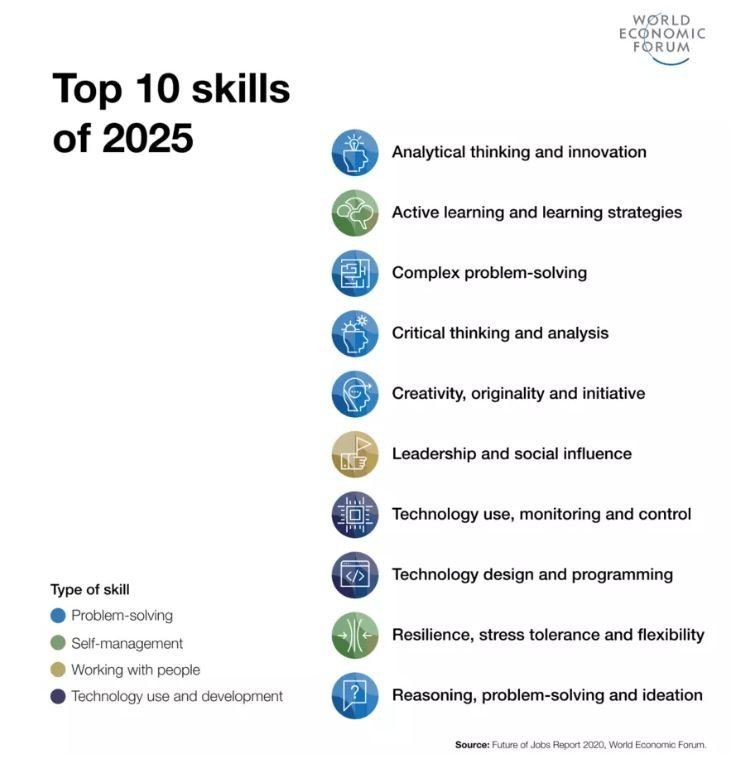Top 10 Skills of 2025: What They Mean For Facilitators and Learners
According to a recent report by The World Economic Forum, critical thinking and problem-solving are at the top of the list of skills employers believe will be needed and sought after in the next three years.
These skills are not “new” but follow a common move from rote types of skills to heuristic approaches to work across the board. Here they are below courtesy of the World Economic Forum:
Via the World Economic Forum
Whether you are leading adult learning (professional learning and development) or student learning (or both), these skills have to be on the forefront of our minds when planning and facilitating. And because so many of us are now leading learning in many different environments, these skills have already been at play in the past few years. They impact both the facilitators and the learners, because both sets of folks need them to be successful.
Let's break down these Top 10 Skills and how they impact both facilitators (workshop leaders, teachers, etc) and learners:
Analytical thinking and innovation
Facilitators must build out new experiences that are innovative and provide opportunities for analytical and divergent thinking to take place. Learners in these types of situations then have a wide array of "answers" instead of following one path to one right answer.Active learning and learning strategies
Facilitators know the research is clear that hands-on and active learning experiences lead to better attention and better retention. Learners benefit by understanding new learning strategies and applying this to other areas in and out of school.Complex problem-solving
Facilitating a workshop is an effort of complex problem-solving. Whether you are running a design sprint or rapid prototyping session, the main goal is problem-solving through discussion and action. Learners who take part in these activities are much more likely to turn-key the types of solutions to complex problem solving.Critical thinking and analysis
Facilitators can allow time for analysis that promotes critical thinking opportunities. Learners take these chances to analyze and think critically as opportunities for growth in many circumstances.Resilience, stress tolerance, and flexibility
Facilitating a workshop and learning experience in a controlled time setting, makes learners use flexible strategies to work on their task, and puts a positive pressure on them to continue to work even when it is difficult.Creativity, originality, and initiative
Whereas many learning experiences lead to a common outcome, workshops are developed so there are many different (and creative) avenues for where learners can end up based on their originality and specific initiative.Leadership and social influence
Facilitation as a skill includes leadership moments on running workshops, and bringing a social influence into the group work taking place throughout the learning experience by all involved.Reasoning, problem-solving, and ideation
Ideation is at the core of a workshop experience where making/creating is a part of the process, but it ultimately leads to critique and revision. Learners must not only solve the intiiatl problem, but also reason how they can make it better based on feedback received throughout the process.Emotional intelligence
Faciitating experiences such as an empathy map provides a clear path into emotional intelligence (EQ) as a new way to think and reason throughout a learning experience.Technology design and programming
Facilitation does not always include technology, but when preparing learning for both in-person, online, and hybrid environments that skill of adaptable/flexible design must lean on tech to provide programming that works across the board.
Key Takeaways:
If you are leading learning, think about how these 10 skills are something you touch on whenever folks are going through a project-based or design-infused learning experience.
Traditional sit-and-get (listen to a lecture and powerpoint) rarely touch on any of these 10 skills.
If we want learners to continue to develop skills that will help in the present and prepare for the unknown future, we have to set up workshops and facilitate types of learning experience that embrace these skills right now (regardless of learning environment or constraints).
Thanks for reading and would love your thoughts on the Top 10 Skills!
